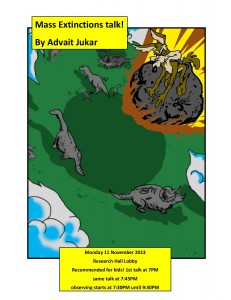The next talk as part of George Mason Observatory’s ‘Evenings Under the Stars’ series (where you’ll also get to look at awesome galaxies, stars, planets and more through our 0.8 meter telescope!) will be ‘Extinction. “Help! All my friends are dead!” ‘ by Advait Jukar. As always the event is free and everyone is invited!
Some details about the event: Monday 11 November 2013: 1st talk at 7 PM, same talk at 745 PM, observing starts at 730PM until 930PM. Directions to GMU and Research Hall here: http://eagle.gmu.edu/map/fairfax.php Zoom in to find Research Hall next to engineering building and York River Rd. Keep an eye on twitter for updates – however since the weather has already postponed the event once we’ll be going ahead with the talk even if we can’t observe! – updates will be available here – Observatory Twitter
About the talk:
Scientists have estimated that about 4 billion species have evolved over the last 3.5 billion years and about 99% of them are extinct. What this tells us is that extinction is a part of life. Every single species that has lived or is alive today will go extinct at some point. However, there have been periods in earth’s history where the rate of extinction has increased over a short period of time. These are the big 5 mass extinctions. Everyone is probably familiar with the extinction of the dinosaurs 65 million years ago, but there have been 4 more, some even more catastrophic. Through this talk, I will explain what the background extinction rate is, describe what the big 5 extinctions were and discuss the variety of causes that lead to the dramatic loss of life. I will talk about how extinction gave rise to, arguably, the most enigmatic organisms to ever walk the earth, the dinosaurs, and what caused many of them to go extinct. I will finally discus whether we are, in fact, nearing the 6th mass extinction.
About the speaker:
Advait Jukar is a PhD student and Provost’s Fellow at George Mason University. He works with Dr. Thomas Lovejoy on the effects of biodiversity loss on coral reef communities in the Caribbean. He likes to describe himself as a biologist who studies ecological change at different scales. He is also a volunteer palaeobiologist at the Smithsonian’s Natural History Museum where he is currently classifying late cretaceous micro-vertebrate fossils.



 Additional questions and feedback on the Observatory site can be addressed to:
Additional questions and feedback on the Observatory site can be addressed to: